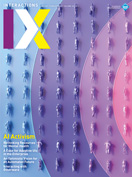Authors:
Rosanna Bellini
If you read a book related to your work, even a fictional one, does that time count as time spent working and not relaxing? This question comes bubbling to the surface of my mind every time I consider reading material that addresses a topic even tangentially connected to my doctoral research—and I often find that my decision further blurs the divide between leisure and work.
Nevertheless, reading for work/leisure has recently become a passion of mine, and I have sought to increase the number of books I have read, particularly from independent or lesser-known authors.

I've recently finished The Comeback by Ella Burman, which I found to be the perfect fictional companion to the events surrounding the #MeToo movement in how disclosing, narrating, and sharing individual accounts can cultivate power to expose patterns of abuse. Rather than focus on the incidents themselves, Burman delicately writes how a child star's life slowly unravels, re-forms, and repairs itself, frequently as a result of her interaction with print and social media channels. It's truly a book that stayed under my skin long after finishing the final chapter. I think such accounts and how they are communicated often serve as a first step to mobilize toward a just world—very much in line with the topic of activism in this issue of Interactions.

I've also been sinking my conceptual teeth into Iris Marion Young's Responsibility for Justice, which examines our responsibility to address structural injustices of the past. Doing so, Young suggests, requires a new model of responsibility. She beautifully unfolds an approach that goes beyond blame and finger pointing at prior behavior, instead embracing a future-orientated social-connection model that instills in us duties for rectifying the deeply ingrained injustices in modern society. She has a true gift for synthesizing political science, philosophy, sociology, and public policy through a compelling mastery of the written word. Her premature passing in 2006 is something that hurts me deeply, particularly when this piece was one of her last blessings.

Dystopian pieces of science fiction, such as QualityLand by Marc-Uwe Kling, have served as an entertaining escape from the confusing reality of now. I find something deeply intriguing in the erosion of value systems within technical design, specifically in examining what these erosions might produce. Kling produces a deliciously absurd take on a world where a consumer megastore, TheShop, can predict what product a person needs, order it, and deliver it, without their consciously being aware they need it. That all sounds mildly appealing, until the main character is delivered an illicit item well outside the realm of his consumer profile, only for TheShop to insist he truly desires it through predictive behavioral analytics. Chaos, of course, ensues, as TheShop is incapable of making a mistake, and canceling such an item is harder than canceling a gym membership.
Dystopian pieces of science fiction, such as QualityLand by Marc-Uwe Kling, have served as an entertaining escape from the confusing reality of now.

Such playful yet frustrating hypothetical scenarios as a result of technical failings also play out in Connie Boje's Underdome, a set of 60 poems that explores connections between technology, (dis)comfort, and sexuality. I was fortunate enough to pick up several of Boje's other works, including Nano Channel and Pay the Drone, in the Glasgow Zine Library, which I visited last year during CHI season. I miss the days when I could huddle inside its doors, away from the inevitable downpour of the city, in such a supportive, warm space for discovering other ideas and skills.
Rosanna Bellini is a Ph.D. researcher in digital civics exploring how digital tools and services can be designed, deployed, and incorporated into domestic violence interventions for people who use violence in intimate relationships. She works in collaboration with charities in the U.K. that deliver sensitive services to mitigate harm against vulnerable populations. [email protected]
Copyright held by author
The Digital Library is published by the Association for Computing Machinery. Copyright © 2021 ACM, Inc.








Post Comment
No Comments Found